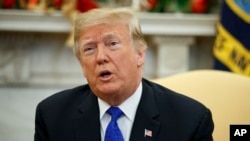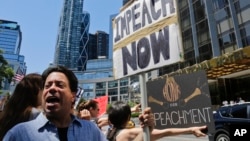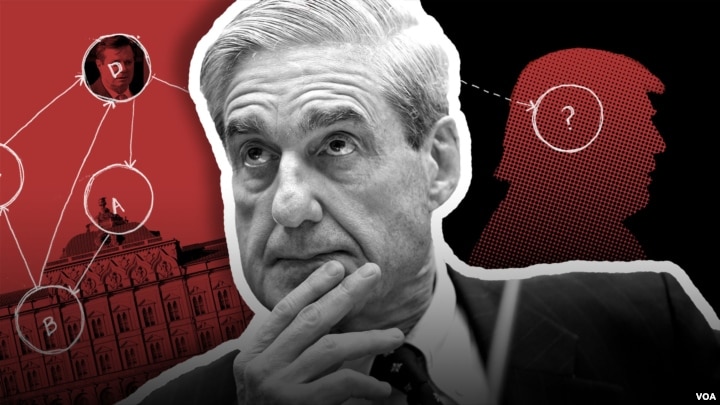Last week, U.S. President Donald Trump’s former lawyer, Michael Cohen, was sentenced to three years in prison for a variety of crimes, making him the most high-profile former Trump associate to face jail time in connection with special counsel Robert Mueller’s probe of Russian interference in the 2016 election.
The sentencing came after Cohen pleaded guilty to lying to Congress and to committing campaign finance violations while making hush-money payments during the 2016 campaign to two women who had alleged affairs with Trump. The president insists he has done nothing illegal and blames Cohen for any legal violations.
Nevertheless, the dramatic allegations made by Cohen raised new questions about just how much legal trouble Trump faces as investigators dig into his past.
Here is a look at the latest twist in the investigation and what comes next.
How much legal trouble is Trump in?
Trump faces allegations that he directed his former lawyer to commit campaign finance violations during the 2016 election. As part of his plea agreement with prosecutors, Cohen alleged that he was directed by Trump to pay adult film star Stormy Daniels and former Playboy Magazine model Karen McDougal a total of $280,000 in order to prevent their allegations from damaging his campaign. That effectively implicated Trump in a federal crime, experts say.
Trump has denied the accusations, telling Fox News he “never directed (Cohen) to do anything wrong” and that the payments were “not a campaign finance violation.”
But American Media Inc., publisher of the National Enquirer tabloid that bought McDougal’s story, told prosecutors in New York that the payment was made in “concert” with the Trump campaign. The AMI assertion undermines Trump’s argument that “I was doing it innocently, and I didn’t know it was a problem,” says Bennett Gershman, a law professor at Pace University in New York.
Is it possible to indict Trump?
There seems to be a consensus among legal scholars that a sitting president can’t be indicted. That belief stems partly from a long-standing Justice Department legal opinion. But there is nothing in the U.S. Constitution that says the president is immune from prosecution.
“The notion that sovereign is immune from the legal process is a feature of monarchy that this country rejected when it established a republic,” says Georgetown University law professor David Super. He adds that while Trump “will not and should not be indicted” for minor technical offenses, prosecutors are likely to rethink their tactics if Trump is found to have committed “clear and serious felonies.”
Another possibility is that the prosecutors could hang back and wait to see if Trump loses reelection and, if so, indict him after he leaves office.
What about impeachment?
The prospect of impeachment appears dim.
The argument for not indicting a sitting president is that he can be impeached and removed from office by Congress for serious crimes. But the process of impeachment is inherently political and hasn't resulted in the removal of a president despite two attempts in the past.
That is because as long as the president's party supports him, any attempt to force him out of office is likely to come up short in Congress.
Impeaching or formally charging a president requires a simple majority vote in the House. But removing him from office requires a two-thirds majority in the Senate after a trial.
While the Democrats will take control of the House in January, the incoming chairman of the House Judiciary Committee, Jerrold Nadler of New York, has warned against an impeachment push without bipartisan support. In the Senate, where Republicans have expanded their majority to 53-to-47, there is no indication that any Republican will seriously consider voting for Trump’s ouster.
Who else is in legal jeopardy?
It’s hard to say. The special counsel has interviewed dozens of witnesses and other subjects of interest, many of them on multiple occasions.
Several people in Trump’s orbit – eldest son Donald Trump Jr., son-in-law and senior adviser, Jared Kushner, and longtime associate Roger Stone -- have drawn the special counsel’s scrutiny. But it’s not clear if they are targets of the investigation or will face criminal charges.
Stone said in August that Mueller’s prosecutors are “coming after me” and that he expects the president’s son to be indicted.
Stone associate Jerome Corsi recently turned down a plea deal offered by Mueller’s office and says he, too, might be indicted.
Gershman, of Pace University, says he expects to see “indictments of many, many different kinds of people” in the new year.
How much longer will the investigation go on?
While Mueller has given no indication that he’s close to wrapping up his investigation any time soon, most legal experts expect the probe to wind down during the first half of next year with additional indictments.
“In 2019, I think many of the pieces are going to fall into place and charges are going to be brought,” Gershman says.
Whether Mueller then releases a final report remains unclear.
Gershman says the so-called “speaking indictments” brought by Mueller’s office – detailed accounts of alleged crimes by various actors – may make the writing of a report “redundant.”











